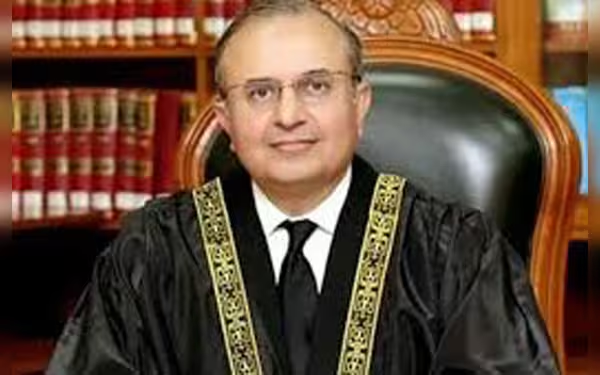Thursday, November 7, 2024 03:25 AM
Justice Mansoor Ali Shah Questions Constitutional Bench Practices in Pakistan
- Justice Shah advocates for regular benches to handle cases.
- Not all cases require constitutional bench attention.
- Judicial Commission to discuss new constitutional amendments.
 Image Credits: dailytimes_pk
Image Credits: dailytimes_pkJustice Mansoor Ali Shah emphasizes the need for regular benches in Pakistan's Supreme Court, questioning the practice of sending all cases to constitutional benches.
The Supreme Court of Pakistan has recently been at the center of discussions regarding the efficiency of its judicial processes. Justice Mansoor Ali Shah, a prominent judge of the Supreme Court, has raised concerns about the practice of transferring every case to constitutional benches. During a hearing on an overbilling case, he emphasized the need for regular top court benches to handle more cases, stating, "Leave some cases with us too." This statement highlights a growing sentiment among some judges that not all cases warrant the attention of constitutional benches, which are typically reserved for significant legal and constitutional issues.
In the specific case discussed, the petitioner’s counsel argued that the 26th Amendment introduced new grounds that could justify referring the case to a constitutional bench. However, Justice Shah countered this argument by asserting that the case did not present substantial constitutional or legal questions, thus making a constitutional bench unnecessary. The court ultimately decided to close the case, while also noting that appeals related to previous judgments on overbilling were still pending.
Meanwhile, the Judicial Commission of Pakistan (JCP) is set to hold its first meeting to discuss the formation of constitutional benches in light of the recently passed 26th Constitutional Amendment. This amendment has significant implications for the judiciary, including the establishment of a JCP secretariat. The JCP plays a crucial role in nominating judges to superior courts and has been reconstituted following last month’s constitutional changes.
The upcoming meeting, chaired by Chief Justice of Pakistan Yahya Afridi, will include 12 members, among them three senior Supreme Court judges. The commission also comprises representatives from the government and opposition, ensuring a balanced approach to judicial nominations. Notably, the inclusion of a woman member, Roshan Khursheed Bharucha, reflects a commitment to diversity within the commission.
As the JCP prepares to convene, it is essential to recognize the broader implications of these developments. The establishment of constitutional benches, as outlined in the amended Article 191-A, aims to enhance the Supreme Court's ability to address original, appellate, and advisory jurisdiction effectively. This change comes at a time when the judiciary is under scrutiny, and the public is keenly observing how these reforms will impact the legal landscape in Pakistan.
The discussions surrounding the efficiency of the Supreme Court and the formation of constitutional benches are critical for the future of Pakistan's judicial system. As Justice Mansoor Ali Shah aptly pointed out, not every case needs to be escalated to a constitutional bench. Striking a balance between efficiency and the need for thorough legal scrutiny will be vital in ensuring that justice is served promptly and effectively. The upcoming JCP meeting will be a significant step in shaping the future of judicial processes in Pakistan, and it is imperative for all stakeholders to engage constructively in these discussions.













